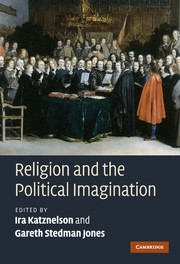Book contents
- Frontmatter
- Contents
- List of contributors
- Acknowledgements
- Introduction: multiple secularities
- 1 Secularisation: religion and the roots of innovation in the political sphere
- 2 Regarding toleration and liberalism: considerations from the Anglo-Jewish experience
- 3 The Enlightenment, the late eighteenth-century revolutions and their aftermath: the ‘secularising’ implications of Protestantism?
- 4 In the lands of the Ottomans: religion and politics
- 5 The Russian Orthodox Church and secularisation
- 6 The American experience of secularisation
- 7 French Catholic political thought from the deconfessionalisation of the state to the recognition of religious freedom
- 8 Religion and the origins of socialism
- 9 From 1848 to Christian Democracy
- 10 The disciplining of the religious conscience in nineteenth-century British politics
- 11 Colonial secularism and Islamism in North India: a relationship of creativity
- 12 The 1960s
- 13 Gendering secularisation: locating women in the transformation of British Christianity in the 1960s
- 14 Does constitutionalisation lead to secularisation?
- 15 Europe's uneasy marriage of secularism and Christianity since 1945 and the challenge of contemporary religious pluralism
- 16 On thick and thin religion: some critical reflections on secularisation theory
- Index
7 - French Catholic political thought from the deconfessionalisation of the state to the recognition of religious freedom
Published online by Cambridge University Press: 05 June 2012
- Frontmatter
- Contents
- List of contributors
- Acknowledgements
- Introduction: multiple secularities
- 1 Secularisation: religion and the roots of innovation in the political sphere
- 2 Regarding toleration and liberalism: considerations from the Anglo-Jewish experience
- 3 The Enlightenment, the late eighteenth-century revolutions and their aftermath: the ‘secularising’ implications of Protestantism?
- 4 In the lands of the Ottomans: religion and politics
- 5 The Russian Orthodox Church and secularisation
- 6 The American experience of secularisation
- 7 French Catholic political thought from the deconfessionalisation of the state to the recognition of religious freedom
- 8 Religion and the origins of socialism
- 9 From 1848 to Christian Democracy
- 10 The disciplining of the religious conscience in nineteenth-century British politics
- 11 Colonial secularism and Islamism in North India: a relationship of creativity
- 12 The 1960s
- 13 Gendering secularisation: locating women in the transformation of British Christianity in the 1960s
- 14 Does constitutionalisation lead to secularisation?
- 15 Europe's uneasy marriage of secularism and Christianity since 1945 and the challenge of contemporary religious pluralism
- 16 On thick and thin religion: some critical reflections on secularisation theory
- Index
Summary
Liberty of conscience and liberty of the press were ‘execrable’ ideas, declared the encyclical Mirari vos, of 15 August 1832, dismissing brutally those who claimed that religion could gain anything from either idea. In the wake of Mirari vos, sovereign pontiffs thundered forth condemnations of the French Revolution and of the ‘modern world’. Only truth (that is Catholic truth) had rights: there could not be a freedom not to be Catholic since recognition of such a freedom would entail a culpable indifference to revelation. In the course of the last centuries, the Catholic Church has been confronted with liberal democracy, a political regime whose triumph it had not foreseen, and with which, for this very reason, it was ill prepared to cope. With Dignitatis humanae (1965), the Catholic Church seemed to change its teaching in a fundamental way: the ‘Vatican Council declares that the human person has a right to religious freedom’. Since then, there has been no serious attempt to return to the church's previous anti-liberalism. Catholics acknowledge the supremacy of the Catholic Church over the state, but regard themselves as powerless to implement Catholic rules and ideals at a national level except through the ballot box. This chapter sketches the reasons for this shift from a radical anti-liberalism to a certain type of liberalism. I focus in particular on the intellectual history of the Gallican Church since the internal debates of French Catholicism in this period have often turned out to be the debates about Catholicism as such.
- Type
- Chapter
- Information
- Religion and the Political Imagination , pp. 150 - 170Publisher: Cambridge University PressPrint publication year: 2010



